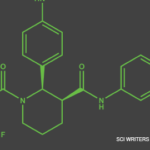Next, Dr. Antiochos addressed the GUSTO study, a proof-of-concept trial evaluating what happens to patients treated with intravenous pulse steroids at the onset of disease and then with tocilizumab monotherapy without ongoing steroids. Enrolled patients had new-onset disease (i.e., diagnosis within four weeks or less) with CRP levels of >25 mg/L, diagnosis proved with biopsy or magnetic resonance/positron emission tomography imaging, and glucocorticoids given for less than 10 days at a maximum dose of 60 mg of prednisone daily. In the study, patients were treated with 500 mg of intravenous (IV) methylprednisolone daily for three days, one dose of IV tocilizumab measured at 8 mg/kg of body weight, and then 162 mg of subcutaneous tocilizumab given weekly for 52 weeks.
The findings: Patients did better than expected. Although only 25% of patients were in remission after 31 days, 78% were in remission by week 24, with 72% remaining relapse free through week 52. However, one patient suffered the onset of anterior ischemic optic neuropathy, one of the most feared complications of disease due to its effects on vision.4 Thus, Dr. Antiochos said his takeaway from this proof-of-concept study was that the glucocorticoid course used in this trial was likely too short, but that current tapering protocols used in clinical practice may represent overtreatment.
COVID-19
Lastly, Dr. Antiochos discussed several clinical pearls related to preventing COVID-19 in patients with vasculitis who are receiving, or will receive, therapy with B cell-depleting agents, such as rituximab.
Given the data on this subject, he advised the administration of SARS-CoV-2 vaccine booster shots be scheduled when B cells have reconstituted in patients treated with rituximab. Also, two patients with ANCA-associated vasculitis who, despite complete B cell depletion after treatment with rituximab, reportedly demonstrated an antibody response to a booster vaccination. These two patients received Johnson & Johnson as their initial vaccine and subsequently the Moderna or Pfizer booster series, perhaps demonstrating improved immunogenicity with combining different types of vaccines.5
Finally, Dr. Antiochos reminded the audience that in December 2021 the FDA issued an emergency use authorization for Evusheld (tixagevimab and cilgavimab). This authorization is for pre-exposure prophylaxis of individuals who are moderately to severely immunocompromised due to a disease or medication and may not mount an adequate immune response to COVID-19 vaccination.
Jason Liebowitz, MD, completed his fellowship in rheumatology at Johns Hopkins University, Baltimore, where he also earned his medical degree. He is currently in practice with Skylands Medical Group, N.J.


